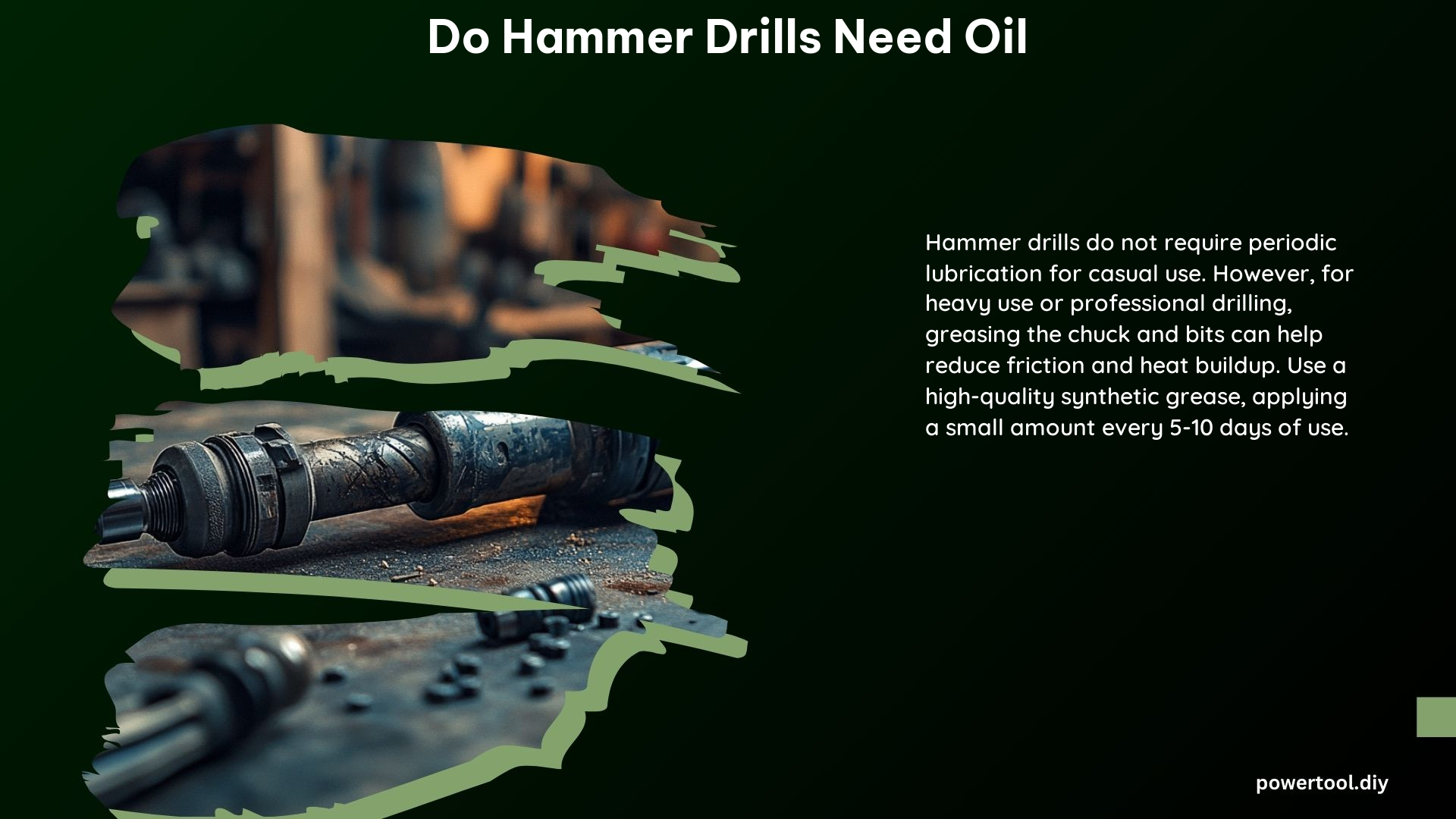Hammer drills, also known as rotary hammers or rotary drills, are powerful tools used for a variety of drilling and demolition tasks. While these tools are designed to function without the need for regular lubrication, understanding the role of oil and grease can help extend the life and performance of your hammer drill.
Lubrication for Casual Use
For casual or occasional users, hammer drills generally do not require regular lubrication. The internal components of these tools are engineered to operate efficiently without the need for frequent oil changes or greasing. Manufacturers often do not include lubrication as a recommended maintenance step in their user manuals, as the tool is designed to function well without it.
Lubrication for Heavy-Duty Use

However, for heavy-duty or professional applications, where the hammer drill is used extensively or under demanding conditions, periodic lubrication can be beneficial. Some manufacturers recommend applying a small amount of high-quality, synthetic grease to the drill bits or chuck before use, especially after extended periods of operation.
Benefits of Lubrication for Heavy-Duty Use
- Improved Hammering Efficiency: Lubrication helps maintain the smooth and efficient operation of the hammering mechanism, ensuring maximum power transfer and productivity.
- Reduced Wear and Tear: Proper lubrication can help minimize the wear and tear on the internal components of the hammer drill, extending the tool’s lifespan.
- Thermal Management: Grease can help dissipate heat generated during heavy-duty drilling, preventing overheating and potential damage to the tool.
Types of Grease for Hammer Drills
When selecting a grease for your hammer drill, it is crucial to use a high-quality, synthetic grease specifically designed for rotary hammer drills. These specialized greases are formulated to withstand the high temperatures, pressures, and vibrations encountered during drilling operations.
Recommended Grease Specifications
- Base Oil: Synthetic base oil, such as polyalphaolefin (PAO) or polyurea, for superior thermal and oxidative stability.
- Thickener: Lithium-complex or calcium-sulfonate thickeners, which provide excellent adhesion and resistance to water washout.
- Additives: Extreme pressure (EP) and anti-wear (AW) additives to enhance load-bearing capacity and prevent premature wear.
- NLGI Grade: Typically NLGI Grade 2, which provides a balance of pumpability and resistance to leakage.
It is essential to ensure that the grease is compatible with the materials used in the hammer drill’s chuck and other components to avoid any potential compatibility issues.
Application and Maintenance
To apply grease to your hammer drill, simply dab a small amount (approximately the size of a pea) onto the drill bit or chuck before installation. Avoid over-greasing, as this can lead to excessive buildup and potential contamination.
For regular maintenance, it is recommended to clean the drill bits and chuck regularly to prevent the accumulation of dirt, debris, and hardened grease, which can contribute to premature wear and reduced performance.
Oil for Drilling Metal
When drilling into metal, the use of cutting oil can be beneficial to extend the life of the drill bits and reduce heat buildup. The cutting oil helps to lubricate the cutting edges, dissipate heat, and flush away metal shavings, all of which can prolong the bit’s lifespan.
However, for drilling into stone, concrete, or other non-metallic materials, the use of oil is generally not necessary. In these cases, water can be used to cool the drill bit and remove debris, as it is more effective than oil for these types of materials.
Technical Specifications
- Grease Application: Apply a small amount (approximately the size of a pea) of high-quality, synthetic grease to the drill bit or chuck before installation.
- Grease Type: Use a grease specifically designed for rotary hammer drills, with a synthetic base oil, lithium-complex or calcium-sulfonate thickener, and extreme pressure (EP) and anti-wear (AW) additives.
- Grease NLGI Grade: Typically NLGI Grade 2 for a balance of pumpability and resistance to leakage.
- Maintenance: Clean the drill bits and chuck regularly to prevent the accumulation of dirt, debris, and hardened grease.
- Oil for Metal Drilling: Use cutting oil to extend the life of drill bits and reduce heat buildup when drilling into metal.
- Cooling for Non-Metal Drilling: Use water to cool the drill bit and remove debris when drilling into stone, concrete, or other non-metallic materials.
By following these guidelines and understanding the role of lubrication in hammer drill performance, you can ensure your tool operates efficiently and maintains its longevity, whether for casual use or heavy-duty applications.
References
- https://diy.stackexchange.com/questions/182637/how-to-lubricate-a-hammer-rotary-drill
- https://www.mig-welding.co.uk/forum/threads/rotory-drill-the-role-of-grease-beyond-general-lubrication.125862/
- https://bobistheoilguy.com/forums/threads/sds-rotor-hammer-drill-grease.379666/
- https://www.youtube.com/watch?v=QWH6LmnR9oM
- https://www.reddit.com/r/Tools/comments/154w38g/should_i_use_cutting_oil_when_using_a_rotary/
